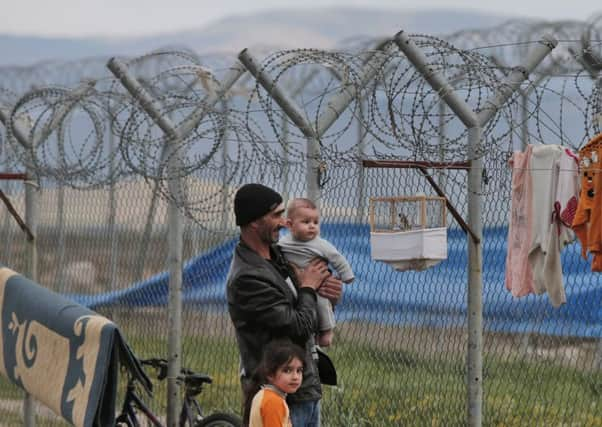EU leaders heading to Turkey to promote new migrant deal


Today’s trip to the Turkish border city of Gaziantep, which is expected to include a visit to a refugee camp, comes amid questions over the legality of the 20 March agreement between the EU and Turkey to start deporting migrants who do not qualify for asylum in Greece back to Turkey.
The EU has pledged up to €6 billion (£4.7bn) in aid to Turkey over the next four years to ease conditions and create opportunities for the estimated 2.7 million Syrian refugees living in Turkey.
Advertisement
Hide AdAdvertisement
Hide AdBut a month after the agreement was signed, few EU experts have arrived in the field and many EU nations are dragging their heels on accepting more asylum-seekers. Diplomatic tussles loom over Turkey’s demands for visa-free EU travel for Turkish citizens.
In an effort to persuade European and Turkish citizens of the deal’s merits, Merkel, EU Council President Donald Tusk, EU Commission Vice President Frans Timmermans and Turkish Prime Minister Ahmet Davutoglu plan to gather in Gaziantep across the border from the Syrian cities of Aleppo and Kobane, epicentres for years of civil war that have abated since a shaky February ceasefire agreement.
The UN refugee agency, rights groups and EU lawmakers have roundly criticised the EU-Turkey migrant deal over the legal and moral implications of expelling people from EU member Greece back to Turkey, a country that many consider unsafe on security and human rights grounds.
Merkel has found herself in a particular bind, backing the deal even as Turkish President Recep Tayyip Erdogan uses an arcane law to sue a German comedian for mocking him.
The 47-nation Council of Europe, a human rights body that is not part of the EU, passed a resolution Wednesday criticising the EU-Turkey deal for what it called “several serious human rights issues”.
Not far from Gaziantep, Turkish authorities have been expelling around 100 Syrians almost daily back to their homeland for the past three months, according to rights group Amnesty International. Turkey insists that it does not deport Syrians.
Only about 10 per cent of Turkey’s refugees are sheltered in camps. The rest primarily fend for themselves in towns and cities.
The European Commission says the number of migrants arriving in Greece from Turkey has slowed dramatically from more than 50,000 in February to around 7,000 over the past 30 days.
Advertisement
Hide AdAdvertisement
Hide AdBut Greece, currently home to 54,000 stranded migrants seeking to travel deeper into Europe, faces unrelenting pressure as the long-promised relocation of asylum seekers from Greece to other EU countries moves pitifully slowly.
When Pope Francis took a dozen Syrians to the Vatican from the island of Lesbos last weekend, he effectively relocated more refugees from Greece than more than a dozen EU countries have managed since September under an earlier European plan to share responsibility for 160,000 refugees in Greece and Italy.